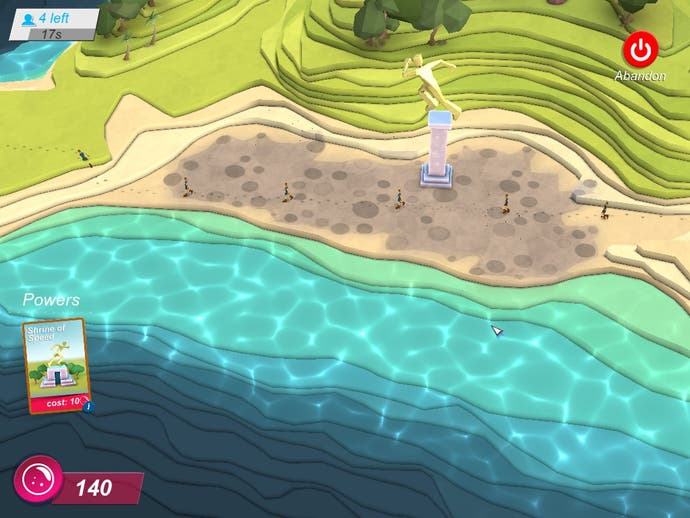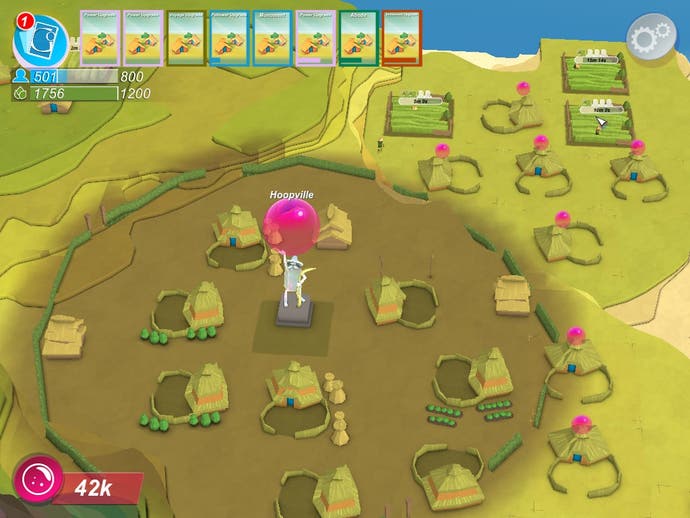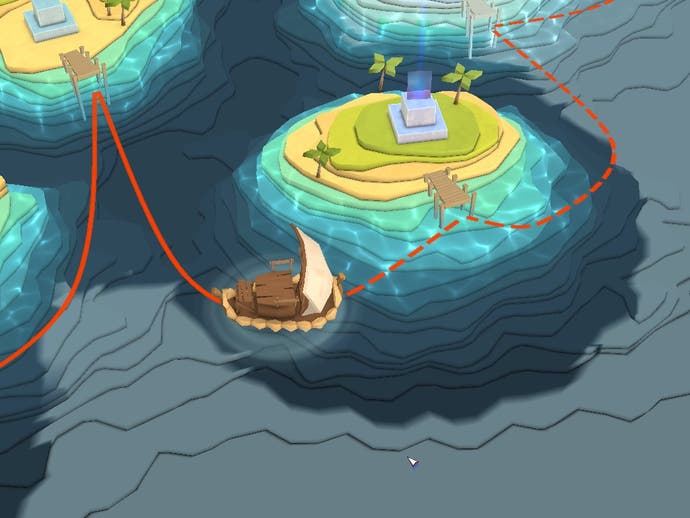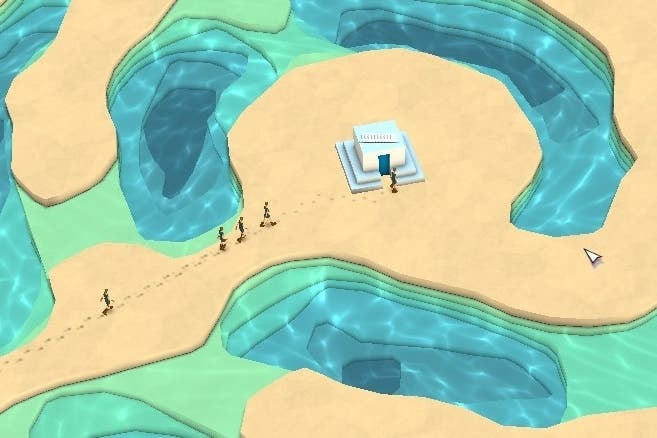Can Godus be fixed?
Fewer clicks don't mean more fun in the 2.0 version of Molyneux's god game.
Godus isn't ready for a re-review yet, but with version 2.0 promising to bring "vast changes", we sent Chris Donlan back in to get the new lay of the land. He's spent 30 hours playing version 2.0.4 (a new update allows access to developer builds). So is 22Cans' "regenesis of the god game" starting to make sense?
The last time I checked in on Godus it seemed to have two central problems: intent and implementation. The stuff it was trying to pull off didn't seem particularly interesting - and it wasn't pulling it off very well, either.
This early incarnation of Godus was a god game that didn't make you feel like a god, a strategy game that rejected all but a single strategy. The only thing you could really do - and you had to do it almost all the time - was flatten out the landscape in order to allow your population to grow. You did that for the first dozen hours anyway, and then you had to plant a few farms and get the grain rolling in before you went back to flattening stuff again. Godus was mainly about watching the numbers tick upwards, and those numbers weren't worth the effort. Particularly when the effort itself involved so much clicking. Harvesting belief, summoning followers, moving the land about in its fiddly tiers: click click click.
General mindlessness and the click-heavy nature of achieving your mindless objectives: intent and implementation. These are both serious problems, but only the first one, I would argue, is truly fundamental to a game at alpha stage. Only the first gets at the twitching heart of the design where all the important stuff should be taking shape. And, sadly, it's also the first of these problems that the game's latest incarnation largely ignores. Godus 2.0 is still inane busywork down to its core. It's still a boring, bug-heavy mess that moves at a miserable pace. You just don't have to click quite as much any more.
To be entirely fair, when it comes to implementation, Godus 2.0 really does involve a lot less clicking. You can now click and hold to destroy trees and boulders en masse, and you can click and hold and swipe to collect belief.
On top of that, you can direct your followers around by a process called leashing. Leashing sees you clicking and holding on a follower or their abode, and then swiping across the screen to highlight where you want them to go. You can leash followers together and direct them outside of their limited bubbles of locational awareness if you want them to build something halfway across the map. The pathfinding ensures they'll often get where you want them to go, too.

Beyond leashing (a strange control method, granted, suggesting once more that the game's true home will be on tablets), you can now drag layers of the ground much further on a single click, a vital fix since Godus is all about manipulating the environment by extending one ordnance survey stratum of earth or squishing another. You're no longer forced to pull a chunk of land a centimetre and then grab it again and pull it again; this alone makes the opening hours move along at a faster clip. Over the long run, however (and the long run, for a game as glacial in its sense of progress as Godus, is very long indeed), these basic tweaks to the controls make less of a difference than you might expect. They merely serve to highlight how confused Godus still is when it comes to the things that truly matter.
In terms of thoughtful, strategic play, the game remains a non-event. There was one approach that worked in the original Godus, and it's the only approach that works now. The playing area is a marvellous landscape of hills and valleys and secluded tropical bays. Your job, alas, still centres on taking all of that and rendering it flat.
Godus is still a game about ruining the environment. Forget the legacy of Populous for a minute: in the age of Minecraft or From Dust, Godus' approach feels misguided, a missed opportunity. Look at the beauty of this rugged world! Think of the potential it might hold. Now steamroll the whole thing. Out goes the pleasure of discovery, out goes tactical reasoning, out goes that series of interesting questions that can famously make strategy and god games the greatest games around. Each natural wonder is nothing more than an unsightly bump in your holy tarmac. Every glorious mountain merely represents the time and energy it will take to get rid of it. The wilderness is an infographic depicting your immediate future: inane toil and the pursuit of grim uniformity.
There are hints that 22Cans is trying to remedy this. Progress far enough in the current build and you'll get incentives for settling on higher ground or near trees, for example. It's too little incentive, though, and it's too artificial. The whole mechanical emphasis of the game is built around flattening stuff - the entire layered approach to landscape rendering and manipulation seems focused on clearing things away rather than building things up - so the faint promise of a few bonuses for taking other things into account isn't very effective. There's still no sign of a grand collaboration between your strategy and the landscape, and, without the inclusion of other players or any obvious threats, there's still little reason to actually strategise anyway. Yes, this is an alpha, and it's possible that Godus is genuinely going to burst into life when hub worlds are in place and you can go and meet other cultures. The bland tools you've been given, however (and the taster of player-versus-player that was included in the initial incarnation) don't seem promising.
Elsewhere, Godus 2.0 has also tinkered with the progression system, swapping out a scrapbook of cards you collect in order to unlock new perks and abilities in favour of a timeline of cards which theoretically gives you a little more freedom. Cards still open up when you reach certain population or grain targets or repair shrines, and most cards still then need to be unlocked by applying resources, which now come in the form of stickers.

Despite the new presentation, the whole thing's still as linear as ever. Uninspired design makes all choices - if they even count as choices - pretty binary, because the cards you're given are either boring or absolutely essential. Meanwhile, the delivery sequence is bizarre. Crucial cards like the one that allows you to sculpt multiple layers of earth at once are held back too long, while early cards are so dull that it's hard not to tire of the whole process completely. Godus wears you down as a player, and it's telling that the best stuff it offers aren't the fun things like meteorites or the option to jab angrily at the ground with a thumb, but the things that will lift a little of the burden that the game's already imposed for no obvious reason. Few games are as blandly, perhaps unintentionally, sadistic as this. Few games treat their players and their time with so little respect.
Unlocking the cards is trickier than it should be, too. Resources are still found in chests scattered around the landscape, although a new bug means that, after a short while, the particle effects telling you where these chests are buried may spontaneously decide to disappear. Once you open up the dock area of the current map, however, you can now earn resources on voyages as well.
Voyages are entirely new for 2.0. They take the form of a mini-game in which you load followers onto a ship and zip from one island to the next on a preset route, earning stickers by getting everyone from the landing stage of a level to a target area. It's simple action-puzzle stuff: sculpt paths through mountains, build walls around AI enemies, and place shrines that will speed your adventurers up (each island comes with a time limit).
This is empty-headed fun for five minutes or so - deep within such a muddled game, it's nice to suddenly have an immediate objective that makes tangible sense. I'm not sure there's lasting potential here, though, and since you'll really need the resources on offer as there are never, ever enough of those stickers to unlock all your cards, it quickly becomes yet another form of grind in a game that already has the grind pretty well covered.
Beyond the grind, there just isn't much going on. Yes, a big part of the reason why Godus is so majestically uninvolving at present is presumably because it's a multiplayer game that you're playing on your own. Another big part of the problem, however, is that its world is so dead. There's little sense of simulation here; nothing unpredictable is bubbling below the surface. There's no wildness to Godus, no tart repercussions.

There's no real sense of a convincing physical world at all, in fact, and that's a problem for a game where you spend most of your time poking at the ground. The land here behaves like no other material I've ever seen as it slurps, often unpredictably, across the floor, eating up your resources in big greedy gulps. Even after the control tweaks, it's costly and not much fun to work with, and interacting with it is accompanied by a sound effect that suggests somebody, somewhere, has an enormous wet tongue and is using it to lick some straw.
Where now? Again, it's worth stating that it's conceivable that hub worlds and proper multiplayer will shake Godus up. Perhaps other people will bring the wildness that's so far missing. It's hard to see how a game that generally can't even shut itself down without the help of Task Manager will handle that kind of complexity in the short term, though - or how a game about flattening stuff is ever going to scale very far beyond griefing.
This is the heart of the problem, really. It's not that Godus is crashy and half-baked and no obvious fun, because lots of Early Access games are. The problem is that, to me at least, Godus doesn't show very much promise that it will ever get better. Its first major patches have focused on fixing surface problems rather than tackling the big issues - like the absence of meaningful ideas at the heart of the whole project, like the fact that you're always working but never really reaping any rewards, and that the game just isn't very playful. As the in-game build times escalate into truly monumental periods of waiting and clock-watching, as the limits of the world you're exploring become more and more apparent, Godus increasingly doesn't seem to have the capacity or the desire to become the game it's been talked up to be. You know, the game with some heroic lottery winner calling the shots and fighting to stay on top in an entertaining manner, the game that Peter Molyneux makes sound so exciting in the letter that appears when you first load up 2.0, in which he claims "we are not making something that has existed before".
In truth, it's still hard to pin down what, if anything, 22Cans actually wants Godus to be. It's probably often this way in development. Maybe a team really needs to "experiment, fail, and experiment again," to quote Molyneux, even if that's under the harsh, critical glare provided by hundreds of customers who have already paid up for the ride. That should sound like typical iterative design at any rate, but after 70 hours of Godus, it actually sounds like blind, panicked, directionless design that chews up eager, talented developers and bores and confuses and angers the players. So far, it's produced a freemium distraction that can't yet admit that's what it truly is, an iPad game that seems to only have landed on PC to soak up some extra funding, and a god game that, when I play it, makes me feel like I'm even less significant than I already am in the real world.









